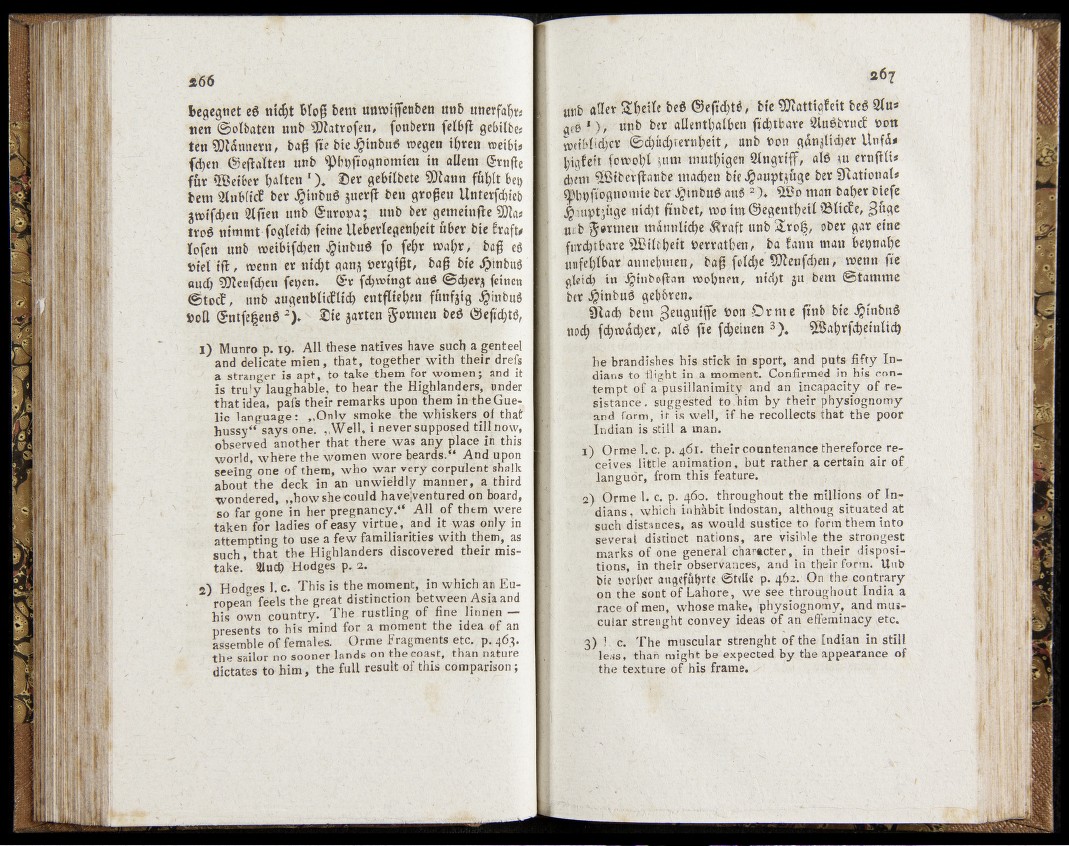
Begegnet eô nic^i Bloß bent unwtfienben unb uneïfaljïi
tien @ o lb atett unb SQîatïofen, fonbern felb fl gebilfce?
ten SDMnnent, bag fie bie\Ç»tnbué wegen ihren wètbis
fd)en © efla ïten unb 9)bi)jïognomten in allem (Etnfïe
fu r ÏB etber galten f p 2)er gebiïbete SDîann fü h lt bei)
tem SlnbïtÆ ber $ ln b u ê guevfb ben grogeu Unterfd)ic&
jwtfcben Elften unb E u r o p a ; unb ber gemetnfle SDias
tto ß n im m t fogleîd) feine Ue6erlegent)eit über bte ïraft#
ïofett unb wetbifeben Jginbuß fo febr w a h r , bag eô
D lcf tffc, wenn er ntd)t gang P e r g ig t, bag bte # tn bu ô
aucb ^ e n fd )e n fepen, <£r fd jw in g t âu6 @djer$ feinen
< §to ce, unb augenblicklich en tfliege« funfgîg # in b u ô
P oli (Jn ifefen ß 2) , «Die jarten fo rm e n beß ©eg'cbtô,
1) Munro p. 19. All these natives have such a genteel
and delicate mien, that, together with their drefs
a stranger is apt, to take them for women;; and it
is truly laughable, to hear the Highlanders, under
that idea, pafs their remarks upon them in the Gue-
lic language: „Only smoke the whiskers of that
hussy“ says one, „Well, 1 never supposed tilfnovv,
observed another that there was any placé in this
world, where the women wore beards.“ And upon
seeing one of them, who war very corpulent shalk
about the deck in an unwieldly manner, a third
wondered, „howshecould have^ventured on Board,
so far gone in her pregnancy^* All of them were
taken for ladies of easy virtue, and it was only in
attempting to use a few familiarities with them, as
such , that the Highlanders discovered their mistake.
31 ud) Hodges p. 2.
2) Hodges 1. c. This is the moment, in which an European
feels the great distinction between Asia and
his own country. Thé rustling of fine linnen —
presents to his mind for a moment the idea of an
assemble of females. Orme Fragments etc. p. 463.
the sailor no sooner lands on the coast, than nature
dictates to him, the full result of this comparison ;
atib aller £ b e tle beê © e (ïd )tê , bt'e SEftattigfeit beß 2 lu *
aeß 1 ) , uub ber. allenthalben fiebtbare Siußbrud: Pott
;©c^ud^teirtiï?eit, unb Pou g&njltdjer
M gfcît fow pl)l ^um n iu tliig e n S Iu g ïtif, a lê ;u ern gti*
d.)cm ^ ßtberfian be madien bte «Çauptjuge ber SRational*
çpbpfiognomîe ber Jjtn bu ê auê *)♦ man baber biefe
jgau ptpige tiîd)t gu bet; w o ltn @ e g c n f|e tl $Mtc£e, g u g e
unb Jortn eti männliche ^ r a ft unb & r o § , ober gar eine
furdjtbare ® l c b e t t P erratben , ba fa n d mau bepnahe
unfehlbar autiehmen, b ag.fo ïd je ?0îeufd)en>- wenn fié
gleîd) in w t iM f o i t w o h n en , ntdjt 5U. bem 0 tam m e
ber $ in b u ß gehören,
9îach bem peugntffe Pon O r m e finb bte $ tn b n ß
noch (d)w ad)er, alß fie fd^emen 3 ) , # a b r fc b e in lic b
he brandishes his stipk in sport, and put» fifty Indians
-to flight .in a moment. Confirmed in his contempt
of a pusillanimity1 and an incapacity of resistance.
suggested to.turn by their physiognomy
and fprm, it is well, if he recollects that the poor
Indian is still a man.
1) Orme 1. c. p. 461. their countenance thereforce receives
little animation, but rather a certain air of^
languor, from this feature.
2) Orme 1. c. p. 460. throughout the millions of Indians
, which inhibit Indostan, althoug situated at
such distances, as would sustice to form them into
several distinct nations, are visible the strongest
marks of one generalch artet er, in their dispositions,
in their observances, and in their form. Unb
bi« ößthet angeführt« ©telle p. 462. On the contrary
on the sont of Lahore, we see throughout India a
race of men, whose make, physiognomy, and muscular
strenght convey ideas of an effeminacy -etc.
3) 1. c. The muscular strenght of the Indian in still
> less, than might: be expected by the appearance of
the texture of his frame,